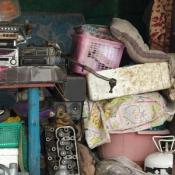 Hoarding is a serious mental health condition that can expose people who do it to dangerous living conditions, the derision of family and friends, and social isolation. About 5% of the world’s population hoards, but only about 15% of people who hoard recognize that their behavior is irrational. If you’re concerned about someone you love who hoards, you can’t force your loved one to get better. You can, however, provide a supportive environment that encourages your loved one to seek help and makes recovery possible.
Hoarding is a serious mental health condition that can expose people who do it to dangerous living conditions, the derision of family and friends, and social isolation. About 5% of the world’s population hoards, but only about 15% of people who hoard recognize that their behavior is irrational. If you’re concerned about someone you love who hoards, you can’t force your loved one to get better. You can, however, provide a supportive environment that encourages your loved one to seek help and makes recovery possible.
Don’t Take Their Possessions
If your loved one’s house is covered in old magazines or unused clothes, it can be tempting to “cure” him or her by taking the items he or she hoards. This won’t remedy the underlying problem, though, and it can destroy your relationship with your loved one. Moreover, people who hoard can experience serious emotional distress when their possessions are taken, so your good intentions may actually harm a person you love.
Don’t Enable the Behavior
While you can’t stop someone who hoards from hoarding, you can avoid enabling the behavior. If your friend hoards antiques, don’t invite her to go antiquing. If your mother is a compulsive collector, don’t add to her collection at every birthday and holiday. Don’t offer to store hoarded items for a loved one, and if you live with someone who has been hoarding, don’t allow their possessions to overtake your home.
Educate Yourself
To the outside observer, hoarding just doesn’t make sense. If you want to help a loved one, learn as much as you can about this condition by reading websites, consulting mental health professionals, or even attending a support group for people who want to love and help people who hoard. Once you understand the fear, loneliness, and anxiety associated with hoarding, you may be better able to offer empathy and support.
Recognize Small Victories
Particularly among people who hoard who have had the habit for years, it can take months or years to get rid of hoarded possessions and for progress with the issue to become visible. If your loved one doesn’t feel like small victories matter, he or she will have little incentive to keep trying. Help your loved one celebrate small victories by praising them for throwing away a few items or refraining from buying new ones.
Help Them Sort Their Belongings
Some people who hoard accumulate so much stuff that it fills an entire house. Even after your loved one stops hoarding, he or she may have an entire home filled with hoarded items. Volunteer to help your loved one sort through his or her items and clean out the home. Some companies specialize in helping those who have hoarding issues clean up, so if you and your loved one are daunted by a packed home, consider contacting an organization that can help.
Don’t Clean Up for Them
Although helping your loved one sort his or her possessions can be helpful, doing it for him or her is not. Likewise, you can’t expect that the person in your life who is hoarding will make progress if you force him or her into treatment. These individuals need to make independent decisions, and this might mean waiting to intervene until the person you love is ready for help.
Help Your Loved One Find Treatment
Taking the first step toward treatment can be daunting, and it’s not always easy to find a qualified therapist. Don’t force your loved one into treatment, but consider researching treatment providers so you can offer information when your loved one is ready. GoodTherapy.org can help you find a therapist who specializes in hoarding.
References:
- Hoarding and OCD, stats, characteristics, causes, treatment and resources. (n.d.). Retrieved from http://www.namimass.org/hoarding-and-ocd-stats-characteristics-causes-treatment-and-resources
- Hoarding: The basics. (n.d.). Retrieved from http://www.adaa.org/understanding-anxiety/obsessive-compulsive-disorder-ocd/hoarding-basics
- How to help the hoarder in your life: Some suggestions. (n.d.). Retrieved from http://www.ocfoundation.org/eo_families_of_hoarders.aspx

The preceding article was solely written by the author named above. Any views and opinions expressed are not necessarily shared by GoodTherapy.org. Questions or concerns about the preceding article can be directed to the author or posted as a comment below.

 Hoarding Behavior: Anxious Response or Lazy Lifestyle?
Hoarding Behavior: Anxious Response or Lazy Lifestyle? How Do I Choose the Right Therapist for Me?
How Do I Choose the Right Therapist for Me?


Please fill out all required fields to submit your message.
Invalid Email Address.
Please confirm that you are human.
Leave a Comment
By commenting you acknowledge acceptance of GoodTherapy.org's Terms and Conditions of Use.